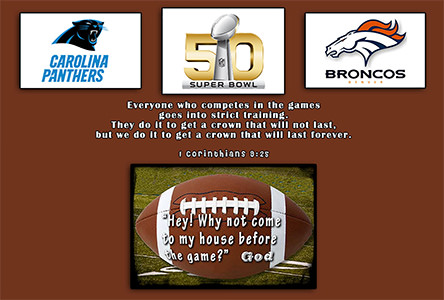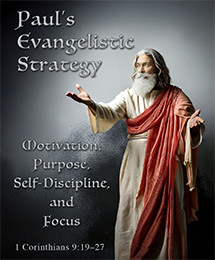First Corinthians 9:19–27 . . .
How to Run Your Race
This week, we’ll see how the Corinthians needed to follow Paul’s example of humility. He also demonstrated the principle of love when he became a Jew to the Jews in order to win Jews; a non-Jewish Gentile to the Gentiles in order that he might win Gentiles; and to the weak he became weak (9:19–22, shown at the bottom of this page). He’ll close chapter 9 with his encouraging instruction on how we should run our individual race using self-discipline in order to “get the prize” (9:24–27).
Paul now moves from the subject of giving up his right to financial support to giving up cultural rights. In vv. 15–23, Paul explains that his passion for lost people and for preaching the gospel consumes him. Consequently, he’ll go to any and every length to share Christ.
In vv. 19–22, Paul describes his passion to do whatever it takes to win lost people to Christ. Six times in one paragraph he states his desire to reach the lost; he reaches them by adapting his methods according to the group he tried to reach. He goes after anyone and everyone: (1) Jews; (2) “under the law” (probably includes non-Jewish Gentile God-fearers and new believers to Judaism, as well as ethnic Jews); (3) “those not having the law” (refers to Gentiles apart from any Jewish influence); and (4) “the weak” (most likely referring to Christians with weak consciences).
Why does Paul go to such great lengths to win lost people? He tells us in v. 23: “I do all this for the sake of the gospel, that I may share in its blessings.” The work of the gospel was the great axis around which everything in the apostle’s life revolved.
In v. 24, Paul tells us to run the Christian race with the intent to win the prize at the end of the race. The prize is offered to each and every believer. Unlike a foot race, we’re not competing against each other. Note: Every Christian can win the prize! That’s great news because there will always be someone faster, stronger, or smarter than us.
Paul’s “running the race” metaphor works like this: When a person believes in Jesus Christ, he or she becomes a runner in the Christian race. If you’re a Christian, whether you like it or not, you’re a runner. Paul finishes v. 24 with these words: “Run in such a way as to get the prize.” This isn’t a suggestion or a divine option. Instead, Paul issues a command: Run! Don’t walk. Don’t stop. Don’t sit down. Run, because you can win the prize! After all, the point of entering the race is to win the prize, which doesn’t represent salvation, since salvation is a free gift; the prize is an earned reward.
The Christian’s prize is the honor and glory of eternal rewards. It’s not a race to achieve entrance into heaven; instead it’s the joy of hearing Jesus say, “Well done!” (Matthew 25:21, 23). This is the amazing grace of God: We receive salvation as a free gift; then the Lord blesses us on top of that with temporal and eternal rewards for faithfully serving him. Such a God we have!
Paul concludes this paragraph by expressing a sincere fear that he himself could fail to win the prize if he were to run aimlessly. In vv. 26–27, he tells us how to avoid losing our Christian race we run perpetually.
True Christians are involved in a “long-distance race.” Run it in such a way that you obtain the prize of “an imperishable crown.” What could be more desirable than to finish strong for Christ and be with him forever!
Run the straight race through God’s good grace,
Lift up your eyes and seek his face;
Life with its way before us lies,
Christ is the path and Christ the prize.
— John Samuel Bewley Monsell
Hear the National Youth Choir of Scotland
sing this hymn.
The Christian’s race is not a sprint — it’s a marathon.
Note: 1st Corinthians challenges believers to examine every aspect of their lives through the lens of the Gospel. In chapters 8–10, Paul presents these three challenges:
Food offered to idols (ch. 8) | Surrendering his rights (ch. 9) | Warning against idolatry (ch. 10)
› Watch BibleProject’s superb animated video (2 min.) highlighting Paul’s messages in these three chapters.
† Summary of 1 Corinthians 9:19–27
This nine-verse passage presents Paul’s strategy for evangelism and his approach to ministry. Here’s a summary of the key points:
• Paul’s Evangelistic Strategy
Here Paul outlines his flexible approach to reaching different groups with the gospel:
† To Jews, he becomes like a Jew.
† To those under the law, he becomes like one under the law.
† To those not having the law, he becomes like one not having the law.
† To the weak, he becomes weak.
Paul’s overarching principle is becoming “all things to all people” in order to save many.
• Motivation and Purpose
Paul’s motivation for this flexible approach is to win as many people to Christ as possible. He emphasizes that he does this “for the sake of the gospel.”
• Self-Discipline and Focus
Paul uses athletic metaphors to illustrate the discipline required in Christian life and ministry:
† He compares evangelism to running a race.
† He stresses the importance of self-control and discipline.
† He also aims for a specific goal, not running aimlessly.
Paul highlights the need for intentionality and perseverance in the Christian life, warning against being disqualified after preaching to others.
This passage demonstrates the apostle’s commitment to contextualizing the gospel message without compromising its core truths, while also emphasizing the personal discipline required in Christian service.
- Q. 1 Do you know what race you’re supposed to be running in your life? Are you running with 100 percent of your effort or simply halfheartedly jogging along?
- Q. 2 Running it at your current pace, how long will it take you to get to where God wants you to be? Is it possible to reach God's destination for you at your present pace?
- Q. 3 Paul recognized the potential to be “disqualified” (v. 27). What sin(s) are you most susceptible to succumbing to (e.g., idolatry, ingratitude, immorality, grumbling)? How can you guard against these sins? Who will hold you accountable?
1 Corinthians 9:19–27
New International Version (NIV)
[You can view it in a different version by clicking here; you can also listen to this chapter.]
Paul’s Use of His Freedom
All Super Bowl competitors go into strict training.
Sadly, their crown will not last… But a believer’s crown lasts forever!

Click to enlarge.
19Though I am free and belong to no one, I have made myself a slave to everyone, to win as many as possible. 20To the Jews I became like a Jew, to win the Jews. To those under the law I became like one under the law (though I myself am not under the law), so as to win those under the law. 21To those not having the law I became like one not having the law (though I am not free from God’s law but am under Christ’s law), so as to win those not having the law. 22To the weak I became weak, to win the weak. I have become all things to all people so that by all possible means I might save some. 23I do all this for the sake of the gospel, that I may share in its blessings.
The Need for Self-Discipline
24Do you not know that in a race all the runners run, but only one gets the prize? Run in such a way as to get the prize. 25Everyone who competes in the games goes into strict training. They do it to get a crown that will not last, but we do it to get a crown that will last forever. 26Therefore I do not run like someone running aimlessly; I do not fight like a boxer beating the air. 27No, I strike a blow to my body and make it my slave so that after I have preached to others, I myself will not be disqualified for the prize.

